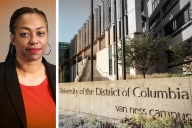You have /5 articles left.
Sign up for a free account or log in.
A student placed in remedial math has a better chance of succeeding in college by taking college-level statistical courses with additional support instead of developmental math, according to a new report published today in the American Educational Research Association's Evaluation and Policy Analysis journal.
The research -- conducted by researchers at the City University of New York -- found that for first-year college students who tested as needing remedial algebra, 56 percent of those assigned to and enrolled in college-level statistics passed, while only 39 percent of those assigned to and enrolled in elementary algebra passed. The students who passed the statistics course also subsequently accumulated more credits.
"The majority fail the remedial elementary algebra. They don't like it and they don't like taking it," said Alexandra Logue, one of the study's authors and a research professor at the Center for Advanced Study in Education at the City University of New York Graduate Center. "But if they take statistics, they have a more positive experience and they're much more likely to pass, and if they still want to do the algebra they can come back."
The researchers looked at three ways to approach remedial math. They examined a traditional remedial algebra course, a corequisite math course with a weekly workshop, and finally the statistics course with a workshop that took place for a couple of hours a week. The students in the study had all said they were not interested in pursuing STEM majors, Logue said.
The workshops used in the statistics courses were also slightly different from corequisite courses, which pair college-level classes with remedial supports. Corequisite remediation, which at one point was a controversial reform, has been advocated for by the nonprofit Complete College America.
Logue said the statistics workshops may involve algebra or helping students with any math area where they struggled in the statistics classes.
"Having students take a math course that's most useful to them in their major just makes sense," said Robin Ozz, president of the National Association for Developmental Education. "The statistics is in the quantitative reasoning path …. They're still getting that logical deduction and critical thinking just in ways they can use in their majors. There are a lot of ways we can teach that besides putting it in algebra."
Math remediation can be a huge barrier to increasing graduation rates. More than 80 percent of students who are assessed as needing math remediation never complete the course work, according to the report.
Ozz said the shift to more math pathways will help students be more successful when they're placed in remediation.








